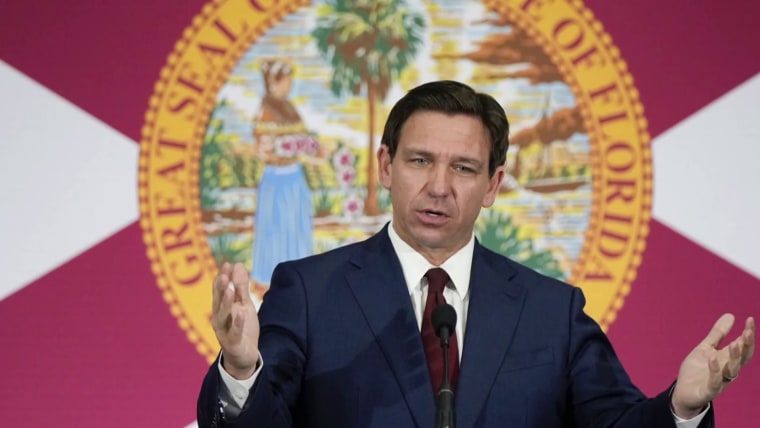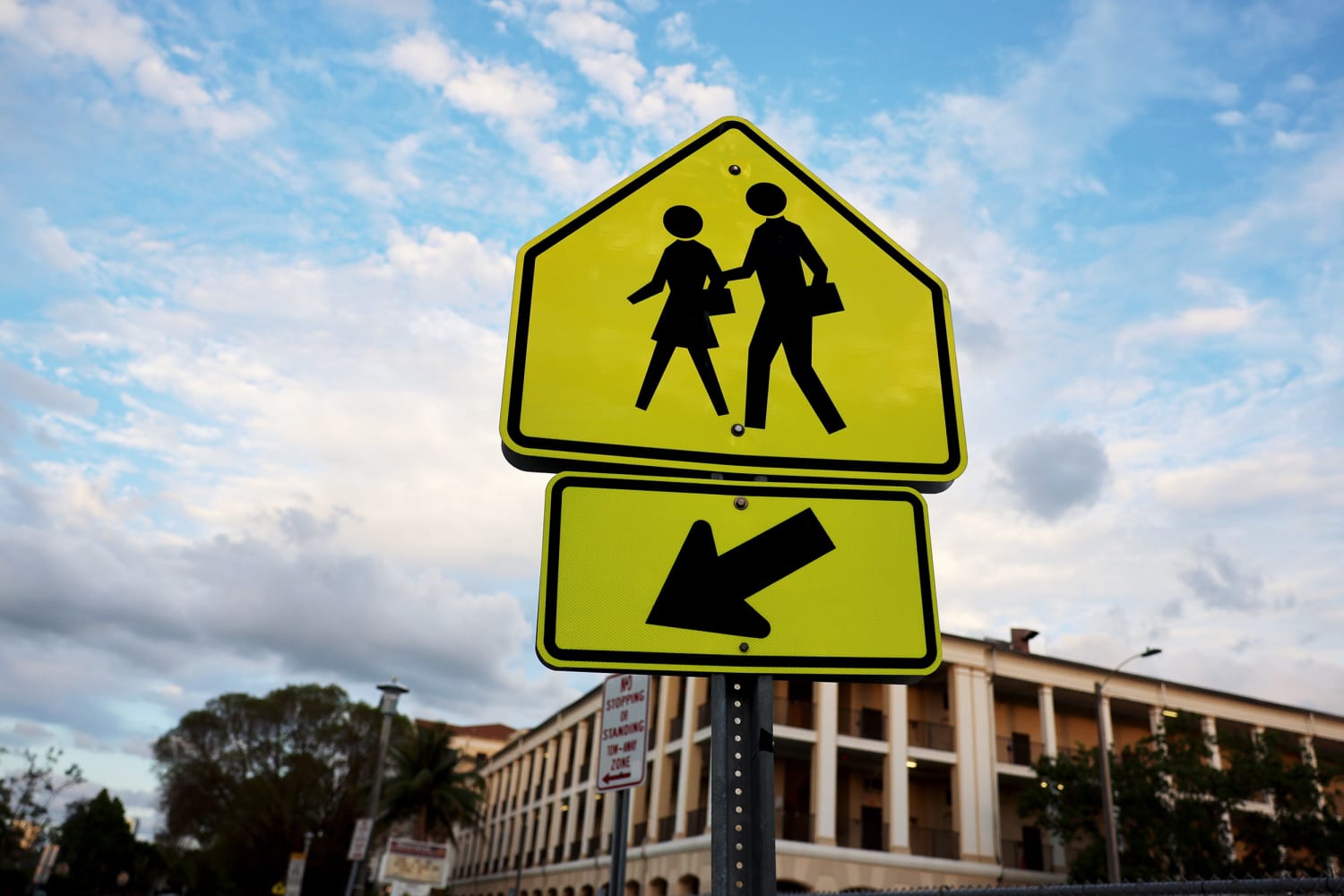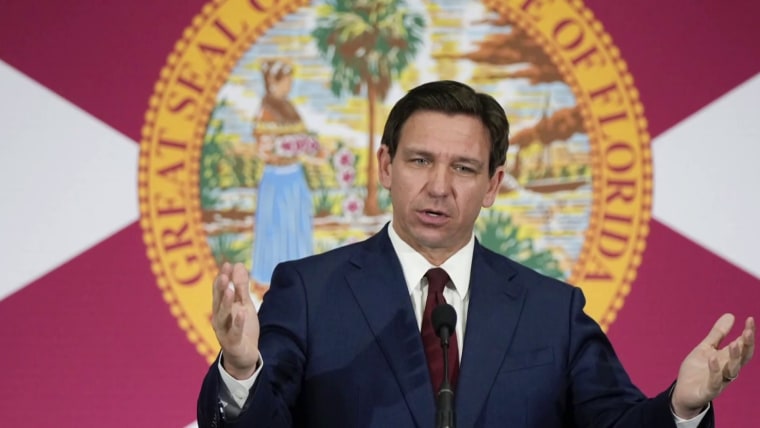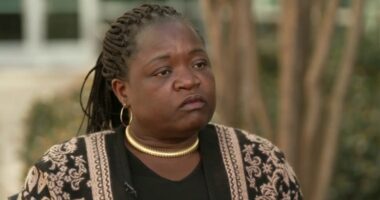As the start of the school year approaches in Florida, some teachers say chaos and confusion have marked the days leading up to reopening as they navigate how to teach under new state policies. Teachers say they are going into classrooms less confident about their lesson plans, confused about changes to state laws and on high alert that once-benign instructions could now get them fired or charged with felonies.
“I don’t know how to approach the year,” said Richard Judd, a social studies teacher at Nova High School in Broward County. “There’s a lot of different ways you can get in trouble. And that’s what’s so insidious about these policies.”
Mayade Ersoff, 61, who teaches civics and world history at Palmetto Middle School, said she had not had any guidance from the school’s principal or Miami-Dade Public Schools about recent decisions that have made national headlines, such as the state’s new African American history standards for K-12 students, which include instruction that enslaved people benefited from skills that they learned.
“It’s very unsettling,” Ersoff said.
Judd, 52, said he was unsure whether his school district had even had time to “digest” any of the changes.
“I don’t know that anybody has any guidance, because so many of these things came out so recently,” Judd said. “They came out within weeks of the school year, which is what really makes them so disruptive.”
Some teachers said they were holding out hope that a meeting scheduled for the day before school starts in the coming days would help clear up their confusion, even if it comes weeks after their curriculums had been finalized.
The new laws and policies change how schools teach African American history and topics involving LGBTQ people, among other things.
In recent weeks, Florida was accused of effectively banning the College Board’s Advanced Placement Psychology classes because of its sexuality and gender content. The state Education Department said the course can be taught in its “entirety in a manner that is age and developmentally appropriate” — an explanation that some teachers said was borrowed from legislation that is anti-LGBTQ and intentionally vague — leaving teachers vulnerable to attacks from parents and conservative politicians alike. Amid the confusion, several districts said they would stop offering the longtime course.
“They’ve created these really ambiguous terms that can get people in trouble, like losing your teaching license, which is basically losing your livelihood,” Judd said. “Without clear-cut definitions.”
The conflict was spurred by Florida’s Parental Rights Act, which critics call the “Don’t Say Gay” bill. The measure, which Gov. Ron DeSantis signed into law in March 2022, originally forbade instruction about sexual orientation and gender identity in kindergarten through third grade. The Education Department expanded the prohibition to include all grades in April, and DeSantis signed that measure into law in May.
And last week, Hillsborough County Public Schools said students in the district will be reading only excerpts from William Shakespeare’s plays as opposed to the full texts under redesigned curriculum guides developed, in part, to take into consideration the new laws that restrict classroom materials whose content can be deemed sexual. The state already requires that any book in a classroom be deemed appropriate by a librarian or a “certified media specialist.”
Judd said he would not maintain a classroom library or lend any books to students, which he said he had always done in his more than 20 years in the profession, so as not to unknowingly allow students access to any of the books the state has banned.
“The reality is that when you start telling people that they can be a criminal for putting books on the shelf, they’re going to start self-banning,” Judd said.
Florida faces a teacher staffing crisis. The Florida Education Association, the state’s largest teachers union, said there are 6,920 advertised vacancies for teachers statewide, compared to 6,006 at the same time last year. The association cited positions advertised on district websites and blamed DeSantis and “his legislative allies’ anti-education agenda,” saying it is harming Florida’s children.
Jeremy Redfern, a spokesman for DeSantis said the union is “blatantly false.”
In a news release Tuesday, the state Education Department, which did not return a request for comment, said that there are 4,776 teacher vacancies to begin the year, compared to 5,208 last year. “With an average of 1.28 vacancies per school, Florida’s vacancy rate is less than the national average of 2 vacancies per school and less than the 1.4 vacancies per school Florida experienced last year,” the department said.
Miami-Dade Public Schools did not immediately return requests for comment. Broward County Public Schools said it had made parental consent a requirement to enroll in AP Psychology for high school students.
Ersoff and other teachers said they were not confident any clarity would come. The state’s education commissioner, Manny Diaz Jr., backed out of a planned town hall in the predominantly Black neighborhood of Miami Gardens last week that was intended to address the widely condemned African American history standards, among other things. The event had been promoted for weeks. Diaz defended his decision under criticism, saying there was “nothing sudden” about his “inability to attend.”
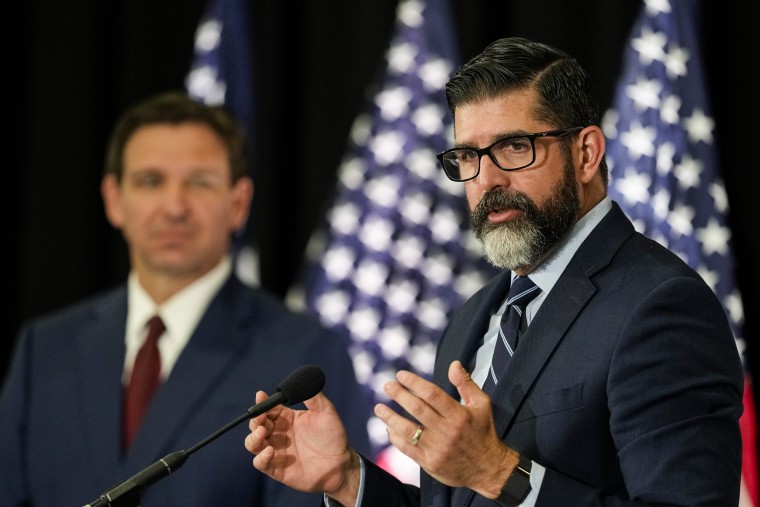
Heather Felton, 48, who resigned from her job teaching English at South East High School in Manatee County at the end of the last school year, said she removed a little less than half of the 700 books she had in her classroom ahead of a planned visit by a media specialist. She said she had a panic attack the day the media specialist pored through her classroom library.
“The day they came through to vet my books, I passed out in class,” Felton said. “That was the big thing — my health was in jeopardy. I have rheumatoid arthritis and other things, and it was flaring so bad. My husband said, ‘You need to get out of this job.’”
She finished out the school year and submitted her resignation in May.
“You make it a felony to be in a possession of a book,” said Felton, who is unemployed. “We’re pretending that LGBTQ people don’t exist. My children are nonbinary; they use they/them pronouns. That is no longer allowed.”
Another high school English teacher in Miami-Dade County, who asked not to be named out of fear of retaliation, said they started telling their students they were being censored in their role as an educator.
“I tell the students about all the rules that have been passed,” the teacher said, adding that they have had to modify their lessons.
“The ‘Don’t Say Gay’ bill is so vague,” the teacher said. “Any parent could say they don’t think we should discuss queer people. The district could be sued, and the teacher could lose their license.”
Lost in the conversation and controversies, the teacher said, is whom the policies affect the most.
“I care about what I do,” the teacher said through tears. “And I know that this is hurting kids. Ultimately that’s what this is about.”
Jose M. Consuegra, 31, who teaches chemistry in the Miami-Dade school system, said he originally believed he was safe from the DeSantis-era policies but no longer believes that.
Consuegra said a student once questioned why he taught a lesson about Black chemists from a science news article outside of Black History Month.
“And I responded, ‘Every month is Black History Month,’” Consuegra recalled. “And then the kid said, ‘I’m gonna tell my principal about that.’”
Nothing came of it, but Consuegra said it made him realize he was vulnerable. He said he also feels limited in what he can say and teach about climate issues in a state where some residents spent “20-something days” under heat advisories.
“At first glance, I really didn’t worry about any of this,” he said. “But now that I’m learning more about it and I’m actually planning my lessons, I’m realizing, ‘Oh, my God, I can’t teach this; oh, I can’t talk about this or I can’t do this, I can’t do that.’ So in essence, it really just damages the students.”
The teachers said they place the blame squarely on DeSantis.
Felton, the retired teacher, said she does not fault principals.
“They’re doing the best they can with what they’ve been handed,” she said. “The state is not giving the district information. The districts need to fight back. The superintendents need to get together and explain this is hurting our teachers. This is hurting our students.”
Source: | This article originally belongs to Nbcnews.com
